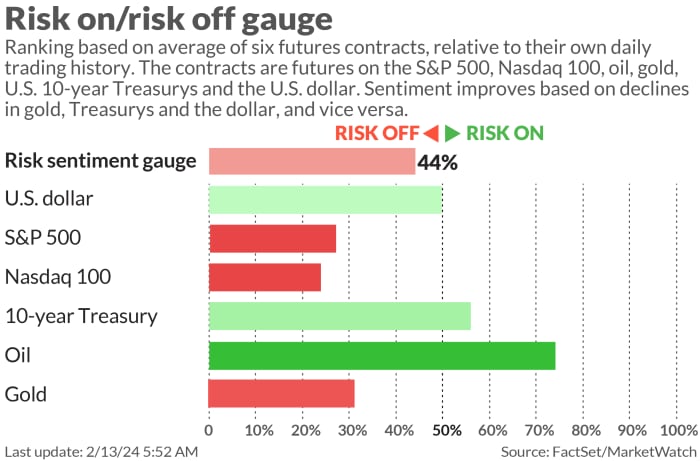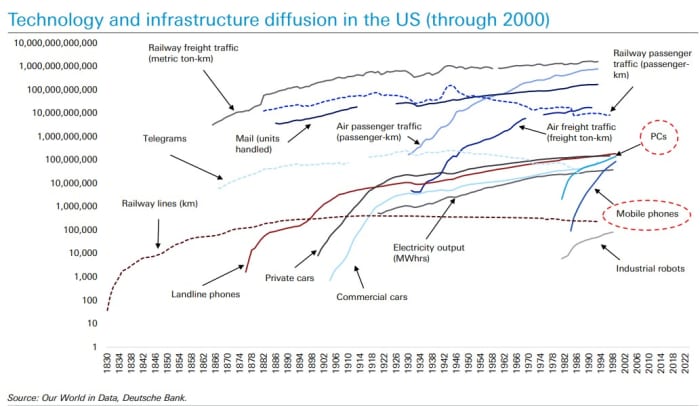Saudi Aramco President & CEO Amin Nasser speaks during the CERAWeek oil summit in Houston, Texas, on March 18, 2024.
Mark Felix | Afp | Getty Images
Top oil executives have been sharply criticized for pushing back against the viability of the clean energy transition at a U.S. conference, with campaigners denouncing an industry claim that the shift away from fossil fuels is “visibly failing on most fronts.”
Speaking during a panel interview on Monday at the annual CERAWeek energy conference in Houston, Texas, Saudi Aramco chief executive Amin Nasser said that a transition strategy reset was “urgently needed.”
The CEO of the world’s largest energy company proposed that policymakers abandon the “fantasy” of phasing out oil and gas and instead “adequately” invest in fossil fuels to reflect growing demand. Aramco and Saudi ministry officials have previously advocated for ongoing investment in hydrocarbons to avoid energy shortages until renewables can fully meet global energy demands.
Nasser’s comments drew applause from the audience at CERAWeek — an annual energy conference by S&P Global that’s known as the “industry’s Super Bowl.”
Other oil and gas executives at the event echoed Nasser’s views, but spoke less directly about the state of the energy transition.
Shell CEO Wael Sawan said government bureaucracy in Europe was slowing the necessary development of clean energy, according to Reuters. Separately, Exxon Mobil CEO Darren Woods on Monday said that demand for petroleum products is “still very, very healthy.”
“So, I think one of the things the policy to date and a lot of the narrative has been very focused on is the supply side of the equation and hasn’t addressed the demand side of the equation. And the impact that price has on demand,” Woods told CNBC’s “Squawk on the Street.”
“At the same time, the cost of converting and moving to a lower-carbon society, if that cost is too high for consumers to bear, they won’t pay. And we’ve seen that play itself out in Europe, with some of the farm protests and the yellow vest protests a year or so ago,” he added.
Campaigners have hit out at the oil industry’s claims this week.
“The fossil fuel industry continues to make distorted claims about our energy future,” Jeff Ordower, North America director at 350.org — a U.S.-based group focused on the global energy transition — said in a statement on Tuesday.
“They work night and day to torpedo a transition to renewable energy and then have the audacity to critique the slowness of the transition itself,” Ordower said. “CERAWeek should highlight a global vision toward a clean and equitable future, and instead, we get talking points from the 1970s.”
Aramco, Exxon Mobil and Shell were not immediately available to comment when contacted by CNBC on Wednesday.
IEA vs. OPEC
The International Energy Agency has previously said it expects global oil, gas and coal demand to peak by 2030 — a forecast that Aramco’s Nasser rejected at CERAWeek. The energy watchdog said in October last year that the transition to clean energy is not only happening, but is “unstoppable.”
“It’s not a question of ‘if’, it’s just a matter of ‘how soon’ – and the sooner the better for all of us,” IEA Executive Director Fatih Birol said in a statement.
The oil-producing Organization of the Petroleum Exporting Countries, which disagrees with the IEA on its outlook for oil demand growth, said earlier this month that it still expects relatively strong growth in global oil demand for both 2024 and 2025.
Participants are seen at the Innovation Agora of the CERAWeek in Houston, Texas, the United States, on March 18, 2024. CERAWeek, known as a superbowl forum in the global energy industry, kicked off Monday in Houston of the U.S. state of Texas, with topics covering the entire energy spectrum but themed on multidimensional energy transition in four fields: markets, climate, technology and geopolitics.
Xinhua News Agency | Xinhua News Agency | Getty Images
Policymakers have also renewed their focus on energy supply security in the wake of Russia’s full-scale invasion of Ukraine and the Israel-Hamas war.
It is in this context that oil and gas executives have repeatedly sought to fend off climate criticism, claiming that Big Oil is not to blame for the climate crisis and warning that it won’t be possible to keep everyone happy in the shift away from fossil fuels.
The burning of fossil fuels such as coal, oil and gas is the chief driver of the climate crisis.
“It’s no surprise to see misleading claims like this coming at CERAWeek, because fossil fuel companies are the biggest cause of the climate crisis, and their continued political influence is the biggest obstacle to solving it,” David Tong, global industry campaign manager at advocacy group Oil Change International, told CNBC via email.
“Oil and gas companies are deliberately slowing and blocking a rapid fossil fuel phase-out with the types of dangerous distractions they are peddling this week in Houston,” Tong said.
‘There’s really no debate’
Some energy companies have scaled back their greenhouse gas reduction targets in recent months.
Activist investors have put pressure on fossil fuel companies to further align their emission reduction targets with the landmark 2015 Paris Agreement, while some have urged firms to scale back on green pledges and instead lean into their core oil and gas businesses.
“What we are seeing now is a desperate attempt from the oil and gas industry to stay relevant and to double down on their old business model despite knowing the products they’ve sold us for decades are responsible for the climate crisis,” Josh Eisenfeld, corporate accountability campaign manager at Earthworks, an environmental non-profit based in Washington D.C., told CNBC via email.
“They’ve failed to evolve their business into one that is compatible with what science tells us must be done to avoid a climate catastrophe. There’s really no debate — science has made it abundantly clear what needs to be done and paramount to that is a transition away from fossil fuels,” Eisenfeld said. “To think otherwise is delusional,” he added.
Source link
#Big #Oils #greenbashing #stokes #backlash #campaigners #hit #talking #points #1970s
















